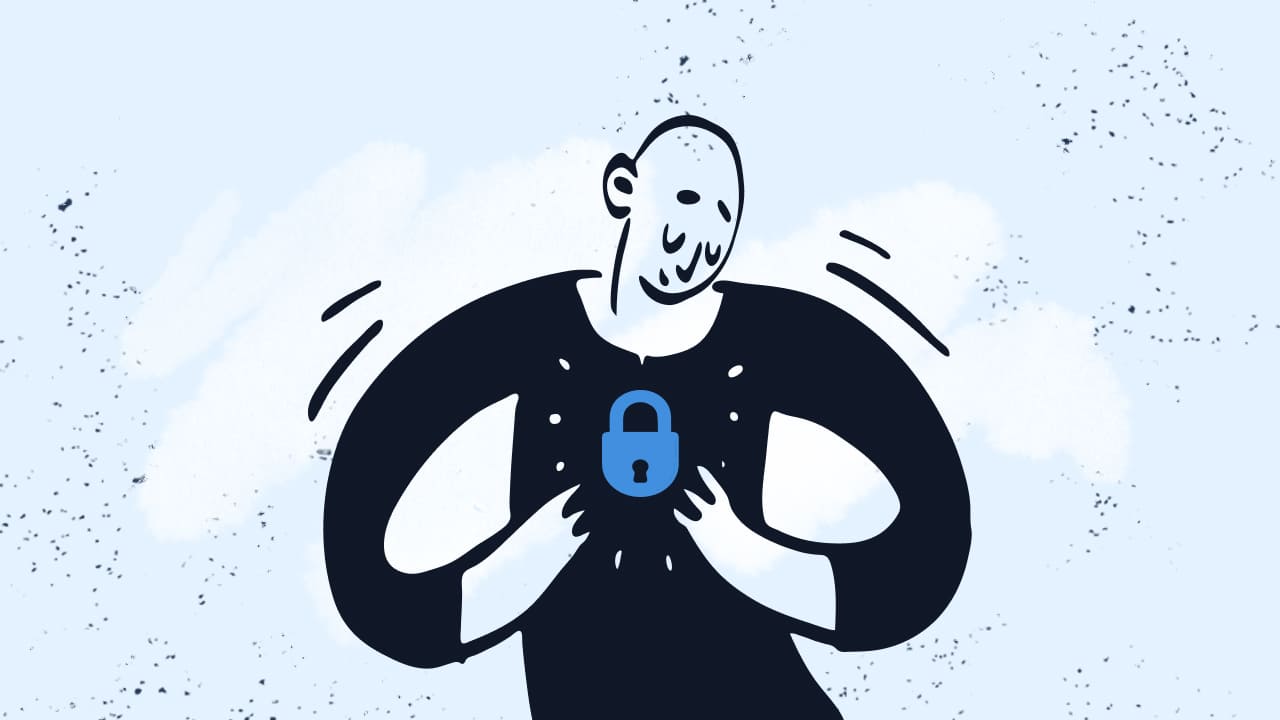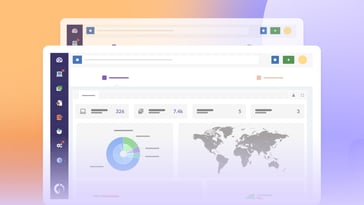Crafting a strong cybersecurity resume can be challenging, especially in a dynamic and competitive field like this one. Your resume must reflect your technical skills, achievements, and passion for cybersecurity.
This guide will walk you through some key tips and strategies to help your resume stand out, get noticed, and convince potential employers that you're the right fit for the job.
General tips for your resume
When it comes to writing your resume, think of it as your personal marketing tool. You want to make a strong impression and clearly communicate your value to potential employers.
Start with a clean, professional layout that makes it easy for hiring managers to read — resume designs are a great starting point so you avoid the creative part. Use consistent formatting, such as bullet points and headings, to organize your information logically. Keep your resume concise—ideally, one page for entry-level positions and no more than two pages for experienced candidates.
Here are some other tips:
- Tailor your resume for each job application: Use keywords from the job description and adjust your experience and skills section to highlight the most relevant aspects of your background. This will help hiring managers see how you’re a fit for the role.
- Quantify your achievements: Whenever possible, use numbers to describe your achievements. For example, if you’ve implemented a system that improved network efficiency by 20% or resolved 50+ technical issues weekly, these specifics help potential employers see the value you bring.
- Highlight your technical skills: Technical abilities are the core of any IT resume. Make sure to list all relevant programming languages, software, tools, and systems you’re proficient in. Use specific examples to demonstrate your expertise.
"Communication, teamwork, adaptability, and problem-solving are crucial for IT professionals who need to collaborate across different disciplines and manage complex projects. These types of soft skills are often the differentiators in career progression, helping professionals stand out in a competitive job market."
Mathew Burrows
SFIA Accredited Consultant and Assessor
Episode 60 of Ticket Volume
Cybersecurity resume tips
Your resume should demonstrate your ability to protect and secure information systems and your knowledge of the latest security protocols. Here’s how to craft a resume specifically for a cybersecurity role:
Focus on security-specific skills and tools
Cybersecurity requires a specific set of skills. Highlight your expertise in areas like threat detection, vulnerability assessment, and incident response. List the tools and software you’re proficient in, such as SIEM systems, firewalls, and encryption technologies.
Mention your experience in protecting systems and data
Detail any experience you have in securing networks, data, and systems. Whether you’ve conducted security audits, managed security operations, or responded to incidents, this experience is crucial for a cybersecurity resume. Provide examples of how you’ve successfully protected or recovered systems from threats.
Show your understanding of regulatory compliance
Cybersecurity often involves ensuring that systems comply with regulations like GDPR, HIPAA, or PCI-DSS. If you have experience with these or other regulatory standards, be sure to include this on your resume, as it demonstrates your ability to navigate the legal aspects of cybersecurity.
Unlocking Career Progression
Discover the strategies to lifelong learning and evolvement in IT
Download for free
Highlight certifications relevant to cybersecurity
Certifications are particularly important in cybersecurity. They demonstrate your knowledge and commitment to the field, validate your skills, and indicate that you stay current with industry standards. We'll cover more about this later.
Demonstrate your problem-solving abilities
Cybersecurity is all about solving problems before they become critical issues. Provide examples of how you’ve identified and mitigated risks, improved security protocols, or responded to threats. This shows your ability to think critically and act quickly in high-pressure situations.
Cybersecurity resume tips for various career stages
Creating a strong cybersecurity resume requires different strategies depending on your career stage. In this section, we will provide straightforward tips for three groups: entry-level candidates with limited experience, professionals looking to switch from other IT roles into cybersecurity, and experienced individuals aiming for senior positions.
Entry-level cybersecurity resume tips
Breaking into cybersecurity at the entry-level requires a strong foundation, even if you lack professional experience. Here are some tips to help your resume stand out:
Highlight relevant coursework, projects, and internships
If you’re just starting out, your education is a key asset. List relevant coursework that aligns with cybersecurity, such as network security, ethical hacking, or information assurance. Additionally, showcase any projects or internships where you applied cybersecurity concepts in real-world scenarios.
Emphasize transferable skills from other jobs or activities
Even if your previous roles weren’t in cybersecurity, many skills still apply. Problem-solving, analytical thinking, and familiarity with IT systems are all valuable in cybersecurity. Highlight these skills and explain how they can be applied to a cybersecurity role.
Consider a functional or combination resume format
If you lack direct experience, a functional or combination resume format might serve you better. These formats focus more on your skills and qualifications rather than a chronological work history, allowing you to present your capabilities more effectively.

Career change resume tips
Here’s how to present your experience if you're transitioning to cybersecurity from another IT role
Explain your motivation for transitioning from another IT department to cybersecurity
Clearly state why you’re moving into cybersecurity. Whether it’s a passion for protecting data or an interest in the growing field, your motivation can help employers see your commitment to the new path.
Highlight transferable skills from your previous experience
Skills like network management, software development, or IT support are often directly relevant to cybersecurity roles. Focus on these transferable skills and demonstrate how they can be leveraged in a cybersecurity context.
Consider obtaining relevant certifications to demonstrate your commitment
Certifications like CompTIA Security+, CISSP, or Certified Ethical Hacker (CEH) show that you’re serious about your career shift. Mention these on your resume to underscore your dedication and readiness for a cybersecurity role.

Senior cybersecurity resume tips
For those with years of experience, your resume should reflect your expertise and leadership in the field. Here’s how to make sure it does:
Highlight your leadership experience and technical expertise
Leadership and deep technical knowledge are critical at the senior level. Highlight your experience managing teams, leading projects, and mastering complex cybersecurity technologies or protocols.
Quantify your achievements and impact on the organization
Where possible, use numbers to show your impact. Did you reduce security breaches by a certain percentage? Maybe you increased the efficiency of incident response times? Quantifying your achievements helps potential employers see the tangible benefits you’ve brought to previous roles.
Mention high-profile projects or initiatives
Senior roles often involve overseeing significant cybersecurity initiatives. Whether you led the implementation of a new security architecture or managed a response to a major threat, ensure these high-profile projects are prominent on your resume.

Cybersecurity certifications
Certifications play a crucial role in establishing your credibility and expertise in the cybersecurity field. They demonstrate your knowledge and show employers your commitment to staying current with industry standards. Here's an overview of some key cybersecurity certifications:
CompTIA Security+
CompTIA Security+ is an entry-level certification that covers essential security concepts. It’s ideal for those new to the field, as it provides a foundation in network security, threat management, and risk mitigation. Security+ is widely recognized and often considered a starting point for a cybersecurity career.
Certified Ethical Hacker (CEH)
CEH certification focuses on offensive security, teaching professionals how to think and act like hackers to identify vulnerabilities before malicious actors can exploit them. This certification is valuable for roles like penetration tester and security analyst.
Certified Cloud Security Professional (CCSP)
With the increasing adoption of cloud services, CCSP certification is a must for professionals focused on cloud security. This certification covers cloud architecture, operations, and compliance, ensuring that certified professionals can effectively secure cloud environments.
Structuring the resume: Keywords, headings, and formatting
A well-structured resume is easier for hiring managers and automated systems (like ATS) to scan, increasing your chances of landing an interview. Here’s how to format your cybersecurity resume for maximum impact:
- Use the right keywords: Employers often use applicant tracking systems (ATS) to filter resumes before they reach a human. To pass through this filter, include relevant keywords from the job description. Words like "cybersecurity," "network security," "threat detection," and specific tools or certifications should be included strategically throughout your resume.
- Effective headings: Your resume should be organized with clear, concise headings that guide the reader. Common headings include "Professional Experience," "Technical Skills," "Certifications," and "Education." Headings categorize your experience and skills, making it easier for employers to find the information.
- Formatting for clarity: Keep your resume format clean and professional. Use bullet points to list achievements and responsibilities, and ensure there is plenty of white space to make the document easy to read. Stick to a standard font like Arial or Calibri, and keep your font size between 10 and 12 points. Additionally, avoid using excessive graphics or colors that can distract from the content.
"I think one common mistake is people think it's a biography. It's like, if I don't tell them every single thing I did, then this might not get me the job. Well, the fact is the resume is to get you the interview."
Robert Fedoruk
Freelance consultant, coach, and speaker
Episode 13 of Ticket Volume
An effective cover letter for cybersecurity roles
A well-crafted cover letter complements your resume and gives you a chance to highlight your qualifications and enthusiasm for the role. Here's how to write an effective cover letter for a cybersecurity position:
- Tailor your cover letter to the job: Each cover letter should be customized for the specific job you’re applying to. Mention the company’s name and the position title, and explain why you’re interested in working there. Connect your skills and experiences to the job description, showing how you can meet the company’s needs.
- Highlight key skills and achievements: Use your cover letter to elaborate on the most important aspects of your resume. Focus on key skills and achievements that make you a strong candidate for the role. For example, if you have experience responding to major security incidents, explain how that experience makes you well-suited for the job.
- Show enthusiasm for cybersecurity: Employers want to hire candidates who are passionate about their work. Express your enthusiasm for cybersecurity and your commitment to keeping up with industry trends and technologies. This demonstrates that you’re not just looking for a job but are genuinely interested in contributing to the field.
Keep it concise and professional: Your cover letter should be concise, typically no longer than one page. Use clear, professional language, and avoid jargon or overly complex sentences. End with a strong closing statement, reiterating your interest in the role and your willingness to discuss your application further.
Final takeaways
Your cybersecurity resume is more than just a list of past jobs and skills—it's your first opportunity to make an impression on a potential employer.
Here are some key takeaways:
- Structure your resume effectively: Use clear headings, relevant keywords, and a format that highlights your strengths.
- Show continuous learning: Demonstrate that you’re committed to staying current in the field.
- Craft a strong cover letter: Tailor it to the job, highlight key achievements, and show your passion for cybersecurity.
- Include certifications: They validate your expertise and show employers your dedication to the field.
Remember, your resume is often your first impression, so it should reflect your professionalism and attention to detail. Lastly, don’t hesitate to ask for feedback from peers or mentors; a fresh set of eyes can catch errors or suggest improvements that you might have overlooked.
Follow these steps, and you'll be well on your way to landing that cybersecurity role you're aiming for.















